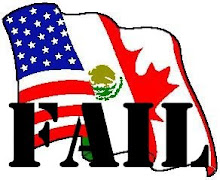She’s anxious. Sitting with her husband, they talk to each other in their native Chinese dialect while looking at their watch. She flags down a CBP officer and points out that their flight will board soon. They, like me, have been chosen for a “random” luggage inspection. When that happens your checked luggage is retrieved from wherever it is in the airport and put through a luggage scanner again (I say again as this is the same machine the TSA use). Of course, the goal of this isn’t just to have a closer look at your luggage – its an opportunity to further scrutinize why you’re travelling to the USA.
The CBP officer tells the woman bluntly that its not her (the CBP officer) fault that she (the woman) didn’t give herself enough time to clear customs when arranging her flight. The woman returns to her seat, still upset.
Meanwhile, the guy sitting across from me has been called up. His luggage has arrived and will be inspected. I watch as the CBP officer goes through his backpack. He also requests his wallet and goes through it.
Another guy at the next numbered counter area is getting himself in trouble. It sounds like he’s going to the US on business, and he’s gotten a visa previously. He’s giving the CBP officer attitude, assuming that since he’s gotten a visa before he should be able to get it again and he’s also trying to avoid or be evasive with his answers to their questions. Another CBP officer joins the discussion, clarifying that visas are evaluated on a case-by-case basis and that the guy should be more respectful of the CBP office and its role. The original CBP officer he was dealing with steps back into the conversation, asking the guy what part of his question he was having trouble understanding. “Do you have some sort of hearing impediment sir, is that why you aren’t understanding me?” he asks. After the lecture, the man is asked to have a seat, they’ll call him up later.
I watch the clock on the wall. 45 minutes to my flight leaving…30 minutes to my flight leaving…I realize that more than likely I’ll miss my flight. There is no urgency in retrieving the luggage, or moving the luggage through the secondary inspection. Finally my name is called, and the officer sends my bag through the scanner. He then asks me some questions – where I’m going, why, when I’m coming back – he’s typing things into his computer, then stamps my passport and walks me out. I have 15 minutes to find my gate.
As he walks me out, we pass the Chinese couple. She’s on her cellphone letting someone know about their situation. Unfortunately, you can’t use cellphones within the secondary screening area. The CBP officer tells the woman to turn off her cell phone.
I was lucky, I made my flight and my bag made it too. I wonder what happened to the Chinese couple, the gentleman who had the extensive search, and the businessman (I’m pretty sure he didn’t make it to the US that day).
This little view within a CBP secondary inspection area illustrates some very important aspects of US border security.
CBP is Not There to Facilitate Your Travel
The frank response to the Chinese lady from the CBP officer that it “wasn’t her fault” she didn’t plan her flights properly isn’t wrong. The CBP is not a travel agency, they’re a security agency. Security trumps everything, including your travel plans. There are reasons why its suggested you get to the airport a few hours early for flights to the US, and CBP is a key reason why.
CBP is Not There to Facilitate Your Business
The guy who was engaging the officers about his visa and previous visits wasn’t doing himself any favors. Especially with the current US economic crisis, there’s a heightened sense of protectionism even if its not overt and blatant. Just because *you* think you qualify for a TN visa doesn’t mean you do – its up to the officer’s discretion. And even if you have a higher-level visa beyond a TN, there’s many instances that show simply having one doesn’t guarantee you’ll be allowed entry into the US.
CBP are People, but We’re Not Their People
One thing that I noted about my time in secondary – the officers were talking and acting like regular people at a workplace. Discussions were what you’d expect at a typical workplace, smiles even. But that was to each other. To the people on the other side of the counter, the demeanor and interaction became serious and formal. Don’t assume you can have the same repoire with a CBP officer as you would with a government employee.
America Is A Different Country
It’s easy to forget that America is a different country from so many in the western world. There are so many similarities, so much shared information, shared culture – but the borders are real, and the underlying political and social differences between countries are real as well. Nobody has a right to enter another country, and if you go in remembering that and knowing what the rules are for your travel purpose, the less risk of being turned away at the border.



